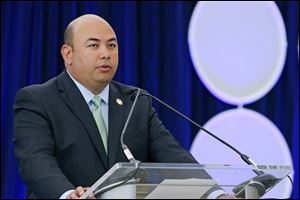
Rosenberger subject of FBI probe into extortion, corruption
8/27/2018
In this June 28, 2016, file photo, former Ohio House Speaker Cliff Rosenberger talks at an event in Columbus.
COLUMBUS — Federal prosecutors searched for evidence of suspected kickbacks or bribes involving former Ohio House Speaker Cliff Rosenberger and major players in the payday lending industry while a bill to reform the industry was pending in Mr. Rosenberger’s chamber, according to documents released Monday.
The documents show the FBI requested emails, travel records, and other information in connection with Mr. Rosenberger and his communications with two payday lending lobbyists and one industry executive.
Mr. Rosenberger has not yet been charged with any crimes.
The Ohio House on Monday also released thousands of pages of documents in response to media public records requests regarding his extensive and often lavish travel and items form his office that he took with him when he resigned, including presidential busts, bobble heads, and sports memorabilia.
Mr. Rosenberger, a Clarksville Republican, resigned in April after revealing that investigators were looking into his travels with people high up in the payday lending industry.
A receipt attached to the FBI search warrant lists the items taken — a computer thumb drive, a box of sport coats and jackets, and three boxes of miscellaneous documents and records. The items were collected May 23.
The warrant indicates the items are believed to be related to potential crimes of extortion and bribery, and violations of the Travel Act, a federal law that makes it illegal to travel out of state or internationally with the intent of committing a crime.
The FBI requested communications between lobbyists Stephen Dimon and Leslie Gaines of Select Management Resources and Carol Stewart, senior vice president of payday lending company Advance America. In particular it sought information concerning “payday lending legislation, evidence of payments, kickbacks, bribes, or other benefits [such as payment of travel-related expenses].”
A footnote in the warrant says “there is probable cause to believe that the targets identified below have used facilities of interstate commerce to promote ... unlawful activity including bribery.”
Mr. Rosenberger’s Columbus attorney, David Axelrod, characterized the search warrant as a one-sided document that amounts to little more than an investigative wish list.
“Speaker Rosenberger has nothing to hide,” he said. “At the outset, he offered his full cooperation by voluntarily providing documents and electronic media without a search warrant or grand jury subpoena. He also consented to the FBI taking numerous documents and photographs from his home that were not covered by the search warrant, and to a consensual search of his storage unit.
“He will continue to provide his full cooperation in anticipation of his ultimate vindication,” Mr. Axelrod said.
Much of the scrutiny regarding Mr. Rosenberger involved his trip to London with lobbyists associated with the payday lending industry.
Ted Saunders and Cheney Pruett, of the Ohio Consumer Lending Association, specifically mentioned this trip in an exchange with state Rep. Niraj Antani (R., Miamisburg), who questioned why negotiations on reform legislation had stalled.
“Neither the OCLA nor the undersigned were aware of the London trip before it happened, and we were appalled upon subsequently learning of it ...,” they wrote on May 15. “OCLA then warned members and leaders of both the House and Senate of the Speaker’s apparent lack of candor, where he was telling members and editorial boards that he favored reform while telling certain lobbyists and their clients that would prevent any reform from taking place on his watch.”
Mr. Rosenberger was speaker when House Bill 123, a payday lending reform bill vehemently opposed by the industry, was stalled in the House. After he resigned, the bill was suddenly ushered to Gov. John Kasich, who signed it.
The payday lending industry had argued that restrictions on interest and fees and other reforms could put many of small lenders out of business.
Contact Jim Provance at: jprovance@theblade.com or 614-221-0496.